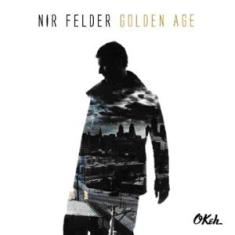
Nir Felder
Golden Age
OKeh ****
What the point of the speeches, fairly random spoken word extracts from a range of significant public figures inserted as a backdrop to tracks such as ‘Sketch 2’ on guitarist Felder’s major label debut amounts to, is anyone’s guess. There’s no obvious political point to be made at least to begin with apart from the fact that these are, yes, stating the obvious, speeches by political figures. So beyond backdrop they serve as examples of public discourse swirling around, inchoate if serious voices off, although structurally they’re useful in the compositional flow. That level of distraction suits this record and maybe the point is that Felder places himself in some sort of recent historical era in American society, and the image on the album cover with an image of an urban scene photoshopped into his frame then places him physically in the world.
Is this ‘golden age’ a reality, Felder seems to be asking, ultimately deciding that instead the American dream has ended. It's a very different approach to the idea, in a jazz context, to that of say John Abercrombie on his recent album 39 Steps.
Where the musical conversation begins is where James Farm left off, that fine very different quartet formed in 2009 featuring Joshua Redman where half the band here bassist Matt Penman and pianist Aaron Parks came of age. But Felder has his own very special sound, quite remarkable for someone who’s relatively new on the international scene, completing the quartet with drummer Nate Smith who's known for his work with Chris Potter.
After the speeches mostly recede although they do come back initially in the spirit of hope at the end in the ‘hidden track’ after some 30 seconds of silence with what sounds like among others the voice of Hillary Clinton on ‘Before the Tsars’ the true atmosphere of the record really embeds itself in.
Characterised largely by lots of slow loose Stratocaster rockisms, anthemic chords that settle and inure themselves, some very subtle voicings (Parks accompanies with a magic touch and breaks free now and then), Felder only occasionally dwelling on formative influences (John Scofield a bit) he’s closer to a player nearer his age such as the Dane Jakob Bro.
On ‘Memorial’ the careful unpacking of improvising lines truly begins with Smith bustling in and Felder opening up the plot of the record. Yet ‘Bandits II’ is the big tune, a little Frisellian, New Melodic, with appeal beyond jazz, it’s just a great piece of instrumental music, the kind of hooky tune that comes along once in while. And there is a plot throughout, odd little episodes, not even poignant but like something out of an Alexander Payne film that connects universally to shed that bit of necessary light on the human condition and within that the state of jazz. Stephen Graham